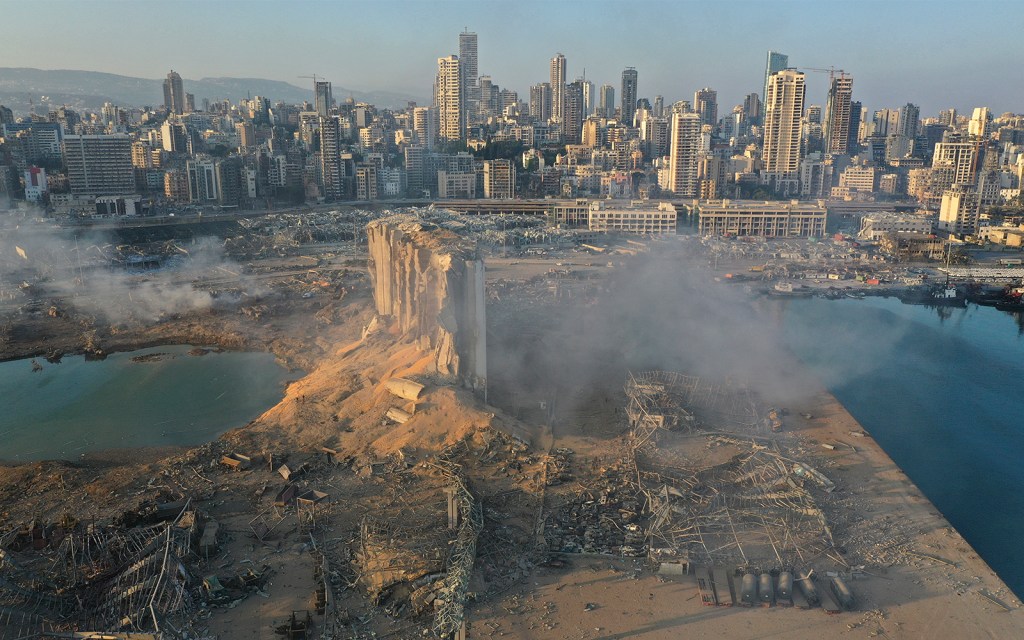- Unpacking African Food Systems: Highlights of the Partnership between TNGO’s Decolonization Observatory and the Food Bridge - 31 January, 2025
- “Without Truth, There’s No Climate Action, and Without Science, There’s No Truth”: TNGO Launches The Observatory on Climate Misinformation at COP29 - 31 January, 2025
- UN Delegates Amplify Youth Voices at Summit of the Future - 26 September, 2024

A devastating mushroom-shaped explosion hit the Lebanese capital, Beirut, on the late afternoon of the 3rd of August, leaving most of the city severely damaged and the port almost completely vanished. Initial claims talked about an explosion in a fireworks warehouse, but further investigation confirmed that there were 2,750 tonnes of ammonium nitrate confiscated in the city’s port, without the necessary safety measures, to cause the explosions and the shock wave blast. Traditionally used as a fertilizer but also as a component of explosives, those tonnes of ammonium nitrate could only cause an explosion of that calibre if in touch with a flammable component.
The intense blast – which would be equivalent to a 3,3 earthquake for its shock wave – has devastated a city that has been suffering with a heavy economic crisis, just topped with the Coronavirus pandemic, which has left its hospitals over their capacity. More than 45% of Beirut’s population lives under the poverty line, and Tuesday’s explosion left the city’s grain silo unusable – Beirut would depend on foreign aid in order to be able to survive such a grave situation, which is spent with random electricity cuts and rationing of goods. Over 300.000 civilians are left homeless amid the explosion, and the wounded count over 5.000.
The death toll rises as victims are recovered from under the rubble, and Lebanon’s economy, which is officially considered a fail, relies on the broad-spread aid received from other countries, who are providing medical equipment and necessary goods to assist the wounded. The estimated material damage is around 15 billion dollars – which leaves Beirut at the mercy of countries and entities willing to offer help. Israel, in spite of lacking diplomatic relations with Lebanon and having a bad past with its neighbour, has offered economic and humanitarian aid, which allegedly Lebanon has not yet accepted.

United States’ President Donald Trump hurried to assume, though with no claims, that the explosion that hit Beirut was the result of an attack – an affirmation that was denied by Lebanese officials and other organizations. Hassan Nasrallah, Lebanese politician and secretary of the Shiite party Hezbollah, pledged his party’s innocence and denied housing weapons and explosives in the port’s warehouse, together with initially refuting the suspicion of Israel’s involvement in the incident. Nonetheless, President Aoun asks to observe the possibility that the explosion may be due to a missile thrown from a raid or a bomb.
Lebanese President Michel Aoun and Prime Minister Hassan Diab created an investigation committee to find and prosecute the explosions’ responsibles within 5 days – beginning with the house arrest of port officials to dismantle anyone who was aware of the threat these chemicals posed. Badri Daher, the head of Lebanon’s Customs Authority, allegedly warned the judiciary repeatedly about harmful substances stored without safety measures in Beirut’s port.
The event happens on the same week of Rafik Hariri’s murder trial, with 4 Hezbollah members charged. The Lebanon Tribunal decided to postpone the verdict for the case to August 18, with the hope that Beirut’s most immediate needs are covered and calmed until that date.

Incensed social protests have risen among the rubble in Beirut against the government and its inability to deal with the country’s crisis, with even some citizen platforms asking for the removal of the current politicians and a come-back to a French Protectorate, seen that French President Emmanuel Macron has presented himself among Beirutis while the local government did not make act of presence nor aid in cleaning up the streets. Hassan Diab, Lebanon’s former Prime Minister, resigned on the 10th August, amid the people’s demands to end up corruption.
On a regional level, Lebanon would risk a similar fate to that of Syria and Libya if unable to reassess its political and economic crisis amid the devastating situation, and due to its current vulnerability, foreign regional forces may try to use this fact to gain benefit and geopolitical influence.
- Will Lebanon be the next bastion for regional and international powers in the area, as have been Syria and Libya?
- What will be France’s role in Lebanon’s transition, as a former colonialist power?
- Will Hezbollah have a say in the coming government? Will the opinion of the Lebanese on Hezbollah change?
Suggested readings
BBC, Beirut explosion: UN warns of Lebanon humanitarian crisis
Bloomberg, How the Beirut Explosion Will Worsen Lebanon’s Crises
CNN, Lebanon’s economy was already in crisis. Then the blast hit Beirut
CNN, Beirut explosion rocks Lebanon’s capital city (live updates)





Pingback: What Does The EU Have To Do With Lebanon? - The New Global Order
Pingback: Ghada Jamal: the Painter of the Lebanese's Suffering and Hope - The New Global Order